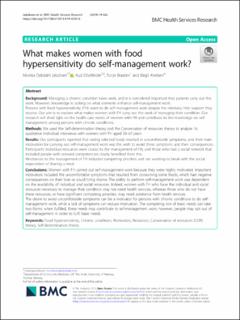| dc.contributor.author | Jakobsen, Monika Dybdahl | |
| dc.contributor.author | Obstfelder, Aud | |
| dc.contributor.author | Braaten, Tonje | |
| dc.contributor.author | Abelsen, Birgit | |
| dc.date.accessioned | 2021-06-21T11:16:44Z | |
| dc.date.available | 2021-06-21T11:16:44Z | |
| dc.date.created | 2019-08-09T10:49:42Z | |
| dc.date.issued | 2019 | |
| dc.identifier.citation | BMC Health Services Research. 2019, 19:462 1-10. | en_US |
| dc.identifier.issn | 1472-6963 | |
| dc.identifier.uri | https://hdl.handle.net/11250/2760388 | |
| dc.description.abstract | Background:Managing a chronic condition takes work, and it is considered important that patients carry out thiswork. However, knowledge is lacking on what elements enhance self-management work.Persons with food hypersensitivity (FH) seem to do self-management work despite the relatively little support theyreceive. Our aim is to explore what makes women with FH carry out the work of managing their condition. Ourresearch will shed light on the health care needs of women with FH and contribute to the knowledge on self-management among persons with chronic conditions.Methods:We used the Self-determination theory and the Conservation of resources theory to analyze 16qualitative individual interviews with women with FH aged 39–67 years.Results:Our participants reported that eating selected foods resulted in uncomfortable symptoms, and their mainmotivation for carrying out self-management work was the wish to avoid these symptoms and their consequences.Participants’individual resources were crucial to the management of FH, and those who had a social network thatincluded people with relevant competencies clearly benefited from this.Hindrances to the management of FH included competing priorities and not wanting to break with the socialexpectation of sharing a meal.Conclusions:Women with FH carried out self-management work because they were highly motivated. Importantmotivators included the uncomfortable symptoms that resulted from consuming some foods, which had negativeconsequences on their lives or could bring shame. The ability to perform self-management work was dependenton the availability of individual and social resources. Indeed, women with FH who have the individual and socialresources necessary to manage their condition may not need health services, whereas those who do not havethese resources, or have significant competing priorities, may need assistance from health services.The desire to avoid uncomfortable symptoms can be a motivator for persons with chronic conditions to do self-management work, while a lack of symptoms can reduce motivation. The competing role of basic needs can taketwo forms: when fulfilled, these needs may contribute to self-management work; however, people may opt out ofself-management in order to fulfil basic needs.Keywords:Food hypersensitivity, Chronic conditions, Motivation, Resources, Conservation of resources (COR)theory, Self-determination theory | en_US |
| dc.language.iso | eng | en_US |
| dc.publisher | BMC | en_US |
| dc.rights | Navngivelse 4.0 Internasjonal | * |
| dc.rights | Navngivelse 4.0 Internasjonal | * |
| dc.rights.uri | http://creativecommons.org/licenses/by/4.0/deed.no | * |
| dc.title | What makes women with food hypersensitivity do self-management work? | en_US |
| dc.type | Peer reviewed | en_US |
| dc.type | Journal article | en_US |
| dc.description.version | publishedVersion | en_US |
| dc.source.pagenumber | 1-10 | en_US |
| dc.source.volume | 19:462 | en_US |
| dc.source.journal | BMC Health Services Research | en_US |
| dc.identifier.doi | 10.1186/s12913-019-4243-6 | |
| dc.identifier.cristin | 1715003 | |
| dc.relation.project | Norges forskningsråd: 188932 | en_US |
| dc.description.localcode | © The Author(s). 2019Open AccessThis article is distributed under the terms of the Creative Commons Attribution 4.0International License (http://creativecommons.org/licenses/by/4.0/), which permits unrestricted use, distribution, andreproduction in any medium, provided you give appropriate credit to the original author(s) and the source, provide a link tothe Creative Commons license, and indicate if changes were made. The Creative Commons Public Domain Dedication waiver(http://creativecommons.org/publicdomain/zero/1.0/) applies to the data made available in this article, unless otherwise stated. | en_US |
| cristin.unitcode | 194,65,70,20 | |
| cristin.unitname | Senter for omsorgsforskning | |
| cristin.ispublished | true | |
| cristin.fulltext | original | |
| cristin.qualitycode | 2 | |

